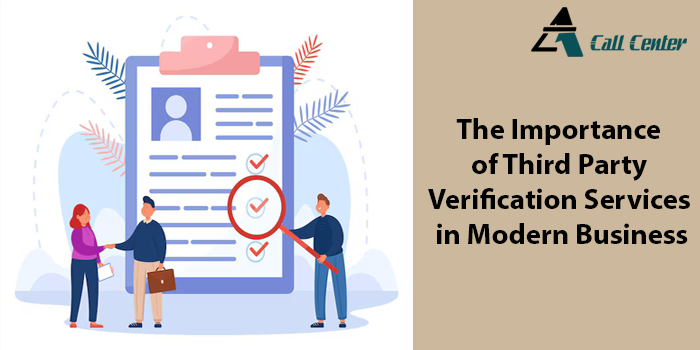In today’s competitive business landscape, trust and credibility are more important than ever. With consumers demanding transparency and organizations relying on complex networks of suppliers, vendors, and service providers, ensuring authenticity has become a critical factor. This is where Third Party Verification Services come into play. Managed by professional third party verification companies, these services help businesses validate information, reduce fraud, and build stronger trust with their customers and partners.
From employee verification to customer transactions, third-party verification systems ensure that the data provided is accurate, reliable, and compliant with regulatory standards. In this article, we’ll explore in detail the role of third-party verification, why companies should rely on a third-party verification service provider, and how these services benefit businesses across industries.
What Are Third Party Verification Services?
Third Party Verification Services (TPV) are independent validation services provided by specialized companies to confirm the accuracy of critical information. This information can include customer details, employee records, business transactions, sales agreements, or compliance requirements.
By outsourcing the verification process to third party verification companies, businesses gain access to unbiased, accurate, and reliable results, minimizing risks and protecting organizational integrity.
Some common areas where TPV services are used include:
- Employee background checks
- Customer identity verification
- Vendor and supplier validation
- Regulatory compliance audits
- Transaction authentication in sales and services
Why Businesses Need Third Party Verification
In an era where fraud, identity theft, and misinformation are widespread, relying solely on internal teams for verification is not always sufficient. Independent verification provides businesses with an extra layer of protection and ensures transparency.
Here are some key reasons why partnering with a third-party verification service provider is essential:
- Fraud Prevention – TPV services ensure that businesses do not fall victim to fraudulent information, fake identities, or false claims.
- Regulatory Compliance – Many industries, such as banking, healthcare, and telecommunications, require compliance with strict regulations. Third-party verification ensures adherence to these rules.
- Unbiased Validation – Independent verification eliminates conflicts of interest, ensuring that the results are trustworthy and impartial.
- Improved Customer Trust – Verified transactions and validated partnerships instill confidence in customers and stakeholders.
- Cost and Time Efficiency – Instead of dedicating in-house resources, companies can outsource verification to experts who provide faster and more accurate results.
How Third Party Verification Companies Operate
Third party verification companies follow standardized processes to ensure accuracy and impartiality. These processes typically include:
- Data Collection: Gathering customer or employee information from businesses.
- Validation: Using multiple data sources, databases, and tools to cross-check and authenticate details.
- Compliance Check: Ensuring that the data meets local and international regulatory requirements.
- Reporting: Delivering detailed reports to businesses, highlighting validated information or discrepancies.
The credibility of a third-party verification service provider lies in their ability to conduct these steps seamlessly while maintaining confidentiality and adhering to data protection laws.
Key Services Offered by Third Party Verification Companies
Different industries require unique verification services. Here are some of the most common solutions provided by leading third-party verification service providers:
1. Employee Verification
Before hiring, companies use third-party verification to validate candidate backgrounds, employment history, education qualifications, and criminal records.
2. Customer Identity Verification
For banks, insurance companies, and telecom firms, verifying customer identities is critical. TPV ensures compliance with Know Your Customer (KYC) regulations.
3. Vendor and Supplier Verification
Businesses rely on third party verification companies to check the legitimacy, financial stability, and reliability of suppliers and vendors.
4. Sales and Service Verification
Many industries, especially telecom and utilities, use third-party verification to confirm customer sales agreements, preventing future disputes.
5. Compliance Verification
Organizations operating in healthcare, finance, and real estate must comply with strict regulatory frameworks. TPV helps in meeting compliance requirements effortlessly.
Benefits of Partnering with a Third-Party Verification Service Provider
Choosing the right third-party verification service provider can transform business operations. Here are some benefits companies enjoy:
- Accuracy and Reliability: Professional verification ensures precise results, leaving no room for errors.
- Scalability: Whether verifying 100 employees or 10,000 customers, TPV providers scale services according to business needs.
- Enhanced Security: Protects businesses from legal and reputational risks by ensuring all data is authentic.
- Global Reach: Many verification providers operate across multiple countries, helping multinational businesses with cross-border validations.
- Focus on Core Operations: Outsourcing verification enables companies to concentrate on growth and innovation, rather than manual checks.
Industries That Rely on Third Party Verification
While every business benefits from verification, some industries rely heavily on third-party verification companies:
- Banking and Finance: For customer KYC and fraud prevention.
- Telecommunications: To validate customer agreements and prevent identity theft.
- Healthcare: To verify medical staff qualifications and maintain compliance.
- Education: To confirm student admissions and credential authenticity.
- E-commerce: To validate sellers and prevent counterfeit goods.

